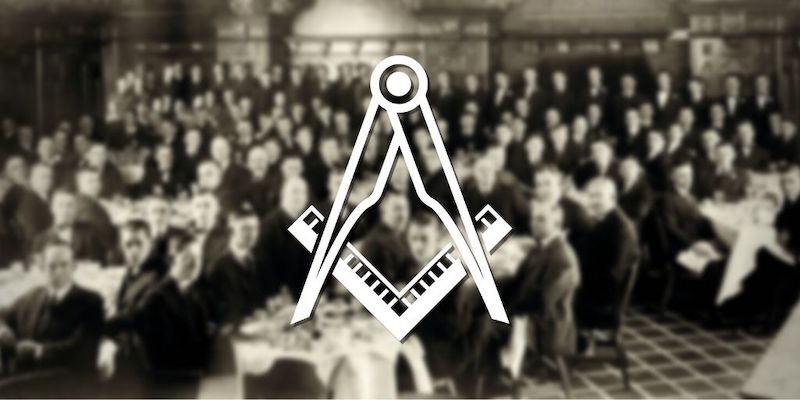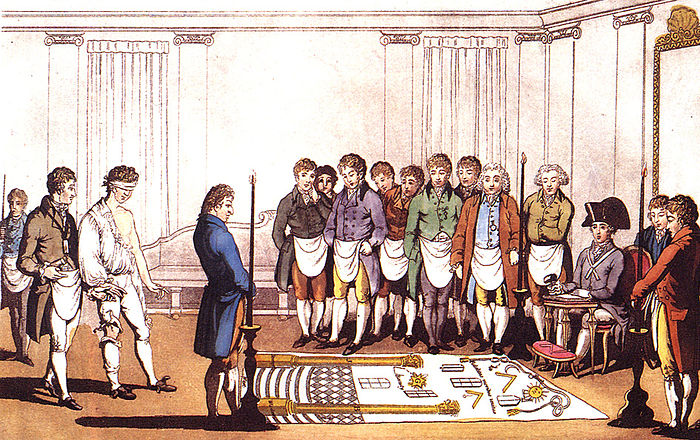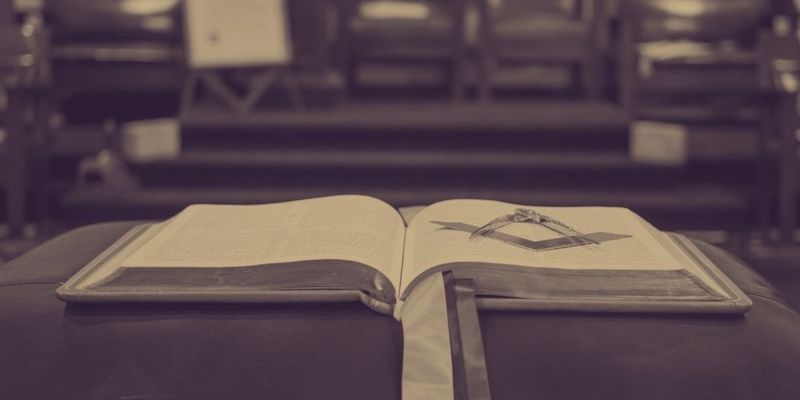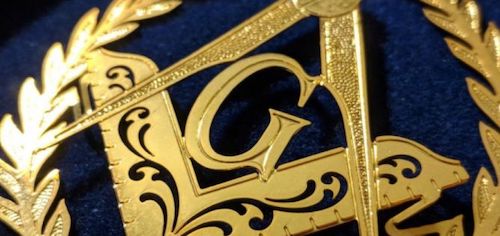Becoming a better man is discovered upon the several paths of each individual man’s “walk” upon them throughout life.
Each man’s path is not singular in time or type. Here, the masculine archetype is employed and perceived, as it may apply to and for the Fraternity of Ancient Free and Accepted Masons, or Freemasons, as they exist in the United States of America.
A fraternity being comprised of men, yet, in this particular instance, not discriminatory towards women.
It is fraternal, but it acts as a charitable, educational, social, and character-building society towards members and nonmembers alike.
While Freemasonry has also been called a secret society by some, its symbols and representation of individual membership will readily be seen on clothing, bumper stickers, taillight covers, coffee cups, rings, hats, signs, and even tattoos that Freemasons proudly support and display.
Historically, one who is part of a secret society will hardly admit he or she is a member thereof or perhaps even that the society itself exists.

Becoming A Freemason
Becoming a Freemason requires that a man is already regarded as “good” and/or “upstanding” within his community, his home, his employment, and his daily life in general.
If accepted for membership into the Fraternity, the good man will learn to become better. To enhance his quality of life and its productivity so as to manifest the very best version of himself on a daily basis.
This element will help the average man appreciate his life and the interactions he may enjoy with others throughout.
To get the most out of life, but to also give back to his community and to those in need whom he is within his ability to help.
This, as with his membership as a Freemason, the good man will never intentionally conceal or withhold from his fellow man or his Brother Masons.
The Greatest Purpose of the Masonic Fraternity

Freemasonry is built upon the cornerstone of truth.
Or, more specifically, to pursue the attainment of truth, unadulterated by political ideologies or religious dogma, yet divine in its nature.
It is divine, as Dr. Albert G. Mackey, 33° remarks in “The Symbolism of Freemasonry”, because:
“The knowledge of the nature of God and of man’s relation to him, which knowledge constitutes divine truth, can never be acquired in this life.” (pg. 55).
Suggesting that by becoming the very best version of ourselves, by graduated steps, we may attain to a degree of knowledge of this truth, and yet, not one man still living may claim to possess all existing truth.
Furthermore, as Dr. Rex R. Hutchens, 33° explains in an advanced Masonic manual, “A Bridge To Light”, about the inculcation of a Mason’s duty:
“We style ourselves Princes, Knights, Chiefs and Masters, not in the earthly sense of titles by which one man may be seen as better in some way than another; rather in assuming such titles we take on the duties inherent in them to become the examples of proper conduct all leaders are, or should be.” (pg. 17).
So it is that Freemasonry, through its teachings, leads a man to become a leader in character, regardless of any actual or formal titles of leadership he may bear in his daily life outside the Fraternity.
One of Freemasonry’s primary mottoes is:
“Better Men Make a Better World”

The first step to becoming a member of the Fraternity of Freemasons is expressed by its very name (this segment will be quite familiar to those who have already been initiated in due and regular form into the Masonic Fraternity), wherein a man must present himself as a candidate, via petition, of his own free will and volition, “unbiased by friends, and uninfluenced by mercenary motives.
As prospective candidates for Freemasonry in the United States are typically not permitted to be proselytized, solicited or otherwise recruited by existing members of the Fraternity.
This is in place as a form of defense against those who would not well serve the purposes of the Fraternity and/or deciding to claim they were convinced and deceived into joining or supporting something they did not approve of, understand or desire to be a member of.
Therefore, to apply, an individual must ask someone whom he knows to be a Mason for a membership petition.
If the prospective candidate does not know anyone who is a Freemason, he may research his state’s Grand Lodge on the internet, and either calls them or fill out their website form, requesting to be contacted for membership purposes.
Arrangements are then made for an in-person meeting between the prospective candidate and members of a Lodge arranged into a group called an Investigative Committee.
These individuals will meet to discuss Freemasonry and the aspirant’s interest in the Fraternity.
They will answer questions the aspirant has and ask some personal questions of him, which he may answer at will.
If he meets the basic requirements as listed below, he will be asked if he wishes to fill out a petition.
The Investigative Committee also inquires as to the merit of the candidate’s character and any criminal background he may have.
(Criminal convictions are heavily frowned upon by Freemasonry, as Masons are intended to be pillars of virtue and integrity in their respective communities).
Before a potential candidate can be considered as such, he must be at least 21 years old and meet three philosophical prerequisites for membership in the Fraternity, which are a firm belief and practice in:
1. The Fatherhood of God, or acknowledgment of the existence of a singular creative force, which created all things, the name of which is relative to the individual perspective and preference.
2. The Brotherhood or fellowship of Mankind, that all human beings, as intentional creations of that creative force, are members of the same family and are all to be treated with kindness and charitable intent.
3. The Immortality of the Soul, or belief in a form of life or existence after physical death.
Required: A Belief in A Supreme Being
The Masonic Order does not accept those who claim the path of atheism, and it is further skeptical of those who profess agnosticism.
The latter of which is a very general belief that something supernatural or beyond human comprehension exists, but, as it is not human, we are incapable of knowing its nature with certainty and should therefore cease to seek such knowledge.
Both of those concepts are contradictory to Freemasonry, which constantly strives to link practical human existence with divine sources.
While it does not discriminately specify whether one divine-source theory or religion contains more truth than another, Freemasonry teaches and expresses by its symbolic and/or philosophical lessons that which each system of divinely inspired teachings has in common with all others.
What one or another person may consider to be “divinely inspired” is contingent upon the individual and is not forced upon others who may believe differently.
Additionally, when a candidate has been accepted as a member of Freemasonry, the ceremonial oath and obligation he must take involve the literal placement of his hand or hands upon the “Volume of the Sacred Law” which is pertinent to his individual religious belief.
From the Masonic perspective, the atheist cannot make or sincerely mean this oath.
As a “godless man” is not bound by any divine laws and cannot therefore pledge to uphold what are considered divine vows, for himself, his Brother Masons or his fellow men, if he has no god to whom he owes fidelity in the first place.
If a man has been permitted to enter the Temple of Masonry, of Divine Truth, and has passed the prerequisite inquiries into his character, he will be able, from this sure foundation, to be raised among his newfound Brethren, part of “a building of God, a house not made with hands, eternal in heaven.” (2 Corinthians 5:1).
His daily life will become a steady yet deliberate labor to build himself, as an example unto his fellow men and Brethren,
“as a living stone built up, a spiritual house, a holy priesthood, to offer up spiritual sacrifices, acceptable to God.” (1 Peter 2:5).
While Masonry employs the use of the Temple of Solomon as a symbolic representation for lessons in moral rectitude and ultimately a mnemonic device in the art of memory, the purpose of the Temple was/is indeed a sacred and holy place, set apart for divine oblations and spiritual sacrifices offered unto God.
To not merely atone for sins committed but also to renew and acknowledge a covenant made with God.
In this sense, a man may build himself both characteristically and spiritually from within the Masonic Temple.
Most often, the sacrifice he offers, to his god, his Brother Mason and to his fellow man is his time.
Earnestly invested in those who will benefit most in a characteristic and/or spiritual sense, the good man, the true Mason, manages his time according to the same manner in which he receives Masonic knowledge: by degrees and steps.
While ascending his ever-winding staircase of life’s unpredictable experiences, the Mason fears not whatever may await next.
As that Illustrious Brother Albert Pike, 33° states in his monumental work, “Morals and Dogma of the Ancient and Accepted Scottish Rite of Freemasonry,” proverbially illustrating the symbol of the winding staircase,
“‘We support ourselves only on that which resists,’ and owe our success to opposition.” (Pg. 745).
Brother Pike here restates a physical law of nature:
“To every action, there is always an opposite and equal reaction, or the mutual actions of any two bodies are always equal and opposite in direction.”
The Master Mason’s Purpose

The wise Mason, guided by the Light of Truth, knows how intimately physical/natural law is connected with divine law and, therefore, measures his steps accordingly.
With a purpose greater than his individual self, he builds according to his measures based upon divine and natural law.
Because of his obedience to and intentional personification of these laws, he is both motivated and protected by them. And we do not fear what we are adequately protected from.
Thus, the Mason’s lack of fear derives from an abundance of Truth and in that Truth, personal accountability for himself; duty towards his god, his country, his Brethren and his fellow men.
The Masonic Light of Truth dispels the darkness of ignorance and therefore, fear.
This process, cyclic in nature, makes of the Mason a deliberate, motivated, empathetic, altruistic man.
A better man than he once was and the best man he has the potential to become.
About the author:
This article was written and submitted by Andrew Burnette for MasonicFind.com